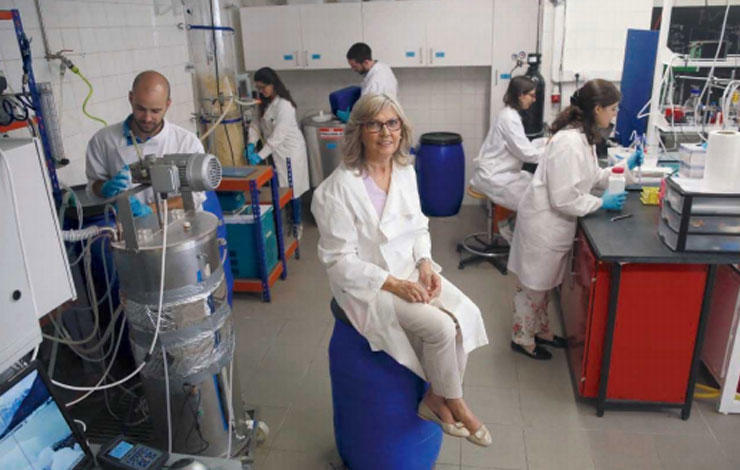20-06-2017

Six European Projects, representing a total of 3 M€ for three years, have been awarded to Biochemical Engineering Lab (BioEng), led by Maria Reis, full professor at FCT-NOVA. These projects are run in collaboration with other research units and industry companies, and aim to study the production of biodegradable bioplastics by bacteria. The biodegradable plastics produced look similar to the conventional plastics, but have the big advantage of taking only 4 weeks to decompose against the several hundred years estimated for the decomposition of the petroleum-derived plastics.
In the BioEng Lab, researchers use different wastewater treatment sources (e.g. milk serum, concentrated fruit juice wastewater, beer wastewater, coffee dregs, etc), sludge from urban wastewater treatment and urban solid waste to feed bacteria, inside bioreactors, that will then produce biopolymers. When these are produced inside bacteria are called Polihidoxialcanoatos (PHA). Maria Reis explains that “PHA biopolymers are a great demand product in market due to its similar chemical and mechanical properties to conventional plastics”. The results obtained by the research group have been impressive: “we have already managed to get from each cell an amount of polymer equivalent 70 to 80% of the weight of each cell, and the remaining is water, protein and cellular material”. The proof of concept is developed on the pilot installation at UCIBIO, where it is produced 2 to 3 kg of biodegradable bioplastics per week, from food industry waste.
The higher price of these biodegradable bioplastics is the only reason why they do not have a market dominant position. However, Maria Reis’s lab is already working on this, and aims to reduce the cost of the new product to more than half of the conventional product. The BioEng research lab is involved in various European Projects in consortium with other European research institutes. “We have been invited to participate in these projects because my research team has been working in this field for more than 15 years and we are pioneer worldwide”, says Maria Reis.
More News:
Expresso
Other Information
About Maria Reis
Maria A. Reis obtained a Degree in Chemical Engineering at IST-UTL in 1978, a PhD degree in Biochemical Engineering at FCT-UNL in 1991 and Habilitation in Biochemical Engineering at FCT-UNL in 2003. Became full Professor in Environmental/industrial Biotechnology at FCT-UNL in 2012
On Going EU Projects:
- H2020-WATER-2015-two-stage - 689785 (SALTGAE) Demonstration project to prove the techno-economic feasibility of using algae to treat saline wastewater from the food industry.
- H2020-IND-CE-2016 – proposal number: 730349 (RES-URBIS) REsources from URban BIo-waSte
- H2020- WATER-2015-two-stage - 690323 (SMART-Plant) Scale-up of low-carbon footprint material recovery techniques in existing wastewater treatment plants.
- H2020-WATER1b-2015- 689242 (INCOVER) Innovative eco-technologies for resource recovery from wastewater”
- H2020-WASTE-2015-two-stage - 688338 (NoAW) Innovative approaches to turn agricultural waste into ecological and economic assets.
- WaterJPI/0007/2014 (Watintech) Smart decentralized water management through a dynamic integration of technologies
- H2020-BBI-JTI-2016-745737 (AFTERLIFE) Advanced Filtration TEchnologies for the Recovery and Later conversIon of relevant Fractions from wastEwater.
- FP7 European Marie Curie ITN project (FP7-PEOPLE-2012-ITN-607492): (Mermaid) Microbial Resource Management and Engineering solutions for the Urban Water Cycle)